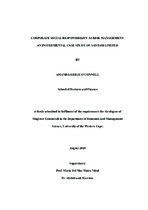| dc.description.abstract | In a contemporary local context characterised by significant socio-economic
challenges, exacerbated by rising systemic risks, and hampered by capacity
constraints of the state, we examine the case for a strategic approach to corporate
social responsibility (CSR) as risk management for the public good. In this study,
we propose that CSR could offer value as risk management to firm stakeholders
and broader society, by aligning state, business, and societal objectives in tackling
shared risk and by addressing some of the challenges associated with
contemporary CSR practice. The objectives of this thesis were, therefore, twofold.
First, to explain the relevance between the concepts of risk management and CSR
and how a strategic approach to CSR as risk management may operate as a
mechanism influencing practice and impact. Second, to analyse such an approach
in practice to interrogate our propositions of CSR as risk management and to
identify its key enabling and disabling factors. To achieve the first objective, we
developed a theoretical and conceptual framework that positions CSR as a
necessary and appropriate strategic risk management response to inefficient and
inequitable markets. To achieve our second objective, we undertook an
instrumental case study of Santam Limited and its proactive, pro-social risk
management initiative, Partners for Risk and Resilience (P4RR). Using a critical
realist case study approach, we interviewed 22 participants drawn from the
company’s social and organisational contexts. Our findings suggest that the
interaction of four principal stakeholder entities gave rise to P4RR: investors,
company management, employees, and the state, and we would characterise the
primary mechanism driving the Initiative as competitive pressures emanating from
the market. Our findings broadly support our propositions that risk management is
a useful analytical framework for CSR and, as a strategic approach, may
encourage firm-wide integration of CSR practice and cooperation with salient
stakeholders, while providing a rubric with which to evaluate its usefulness. Our
findings are somewhat supportive of the proposition that such an approach may
lead to a response to uncertainty that aligns more closely with economic risk
management. Recommendations for future research include multiple case study
analyses of different companies that engage in risk management for the public
good. Strategically, we recommend the elevation of local government planning
processes as a tool with which to align corporate pro-social activities to maximise
the contribution to the public good. | en_US |

